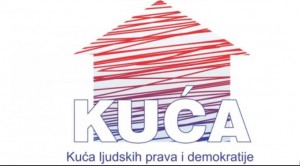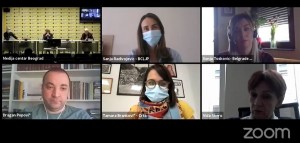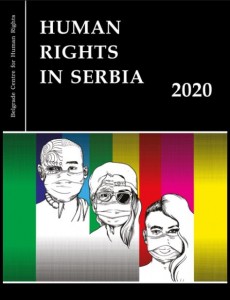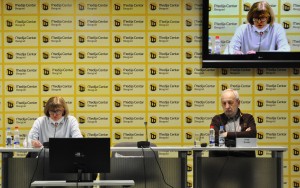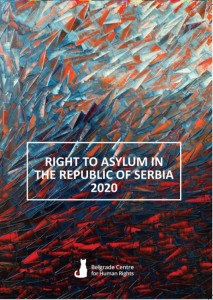The Comfort of Togetherness – The Young and the Old Have Similar Needs – They Need Attention, Respect, Conversation, Exchange, Contact
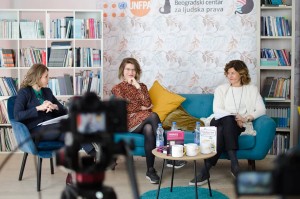 The three-hour online event “Comfort of Togetherness – a Step towards Intergenerational Cooperation,”organised by BCHR’s Youth Programme on Thursday, 25 March 2021, provided young people and people over 65 participating in our Solidarity First Aid (SOFA) Programme with another opportunity to share their insights and experiences with a view to establishing new models of intergenerational cooperation and fostering community solidarity.
The three-hour online event “Comfort of Togetherness – a Step towards Intergenerational Cooperation,”organised by BCHR’s Youth Programme on Thursday, 25 March 2021, provided young people and people over 65 participating in our Solidarity First Aid (SOFA) Programme with another opportunity to share their insights and experiences with a view to establishing new models of intergenerational cooperation and fostering community solidarity.
“Intergenerational cooperation is a fundamental social contract without which humankind cannot survive,” said Equality Commissioner Brankica Janković, who participated in the event. Assistant Representative and Head of Office at United Nations Population Fund (UNFPA) Borka Jeremić said that the COVID-19 crisis exacerbated the intergenerational communication gap.
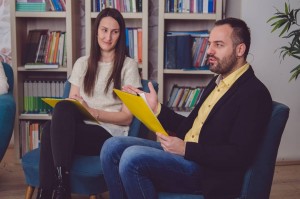 “This is why we embraced the opportunity to creatively support the exchange of knowledge and information between youth and the elderly,” she said in her remarks about the SOFA Programme implemented by UNFPA and BCHR’s Youth Programme since last October.
“This is why we embraced the opportunity to creatively support the exchange of knowledge and information between youth and the elderly,” she said in her remarks about the SOFA Programme implemented by UNFPA and BCHR’s Youth Programme since last October.
Youth Programme Coordinator Nevena Nikolić said that the SOFA Programme was a new challenge prompting the team to leave its comfort zone in work with youth and that, thanks to its spontaneity, intuition and commitment to the needs of both the young and the old, it demonstrated that we could hear and understand each other regardless of our age.
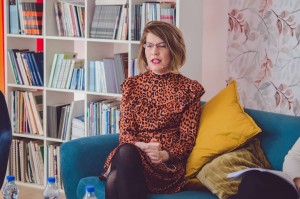 “Understanding each other is very important, we need to hear the elderly, their knowledge and experience,” said youth activist Živkica Milojković, who has been volunteering for years, because, in her opinion, volunteering is “learning for solidarity contributing to both personal and social progress.” National Association of Youth Workers (NAPOR) Programme Coordinator Nemanja Obradović discussed the importance of open intergenerational cooperation free of prejudice.
“Understanding each other is very important, we need to hear the elderly, their knowledge and experience,” said youth activist Živkica Milojković, who has been volunteering for years, because, in her opinion, volunteering is “learning for solidarity contributing to both personal and social progress.” National Association of Youth Workers (NAPOR) Programme Coordinator Nemanja Obradović discussed the importance of open intergenerational cooperation free of prejudice.
“Youth are primarily depicted as a problem rather than as a resource, and we need to change such perceptions," said Obradović, prompting Miloš Grabundžija, the Chairman of the Nezavisnost association of pensioners, to remark that the lack of space and a budget for both the youth and the elderly did the most harm and was the greatest danger to our society because both generations needed to be much more visible.
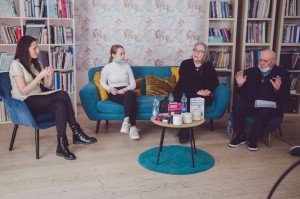 The three-hour ZOOM event was moderated by youth activists Demir Mekić and Ivana Antonijević. In addition to the main part, over 60 participants took part in virtual Working Groups that explored various aspects of intergenerational cooperation: the needs of youth and the elderly and the ideas, methods and techniques that would genuinely contribute to intergenerational cooperation and understanding.
The three-hour ZOOM event was moderated by youth activists Demir Mekić and Ivana Antonijević. In addition to the main part, over 60 participants took part in virtual Working Groups that explored various aspects of intergenerational cooperation: the needs of youth and the elderly and the ideas, methods and techniques that would genuinely contribute to intergenerational cooperation and understanding.
“I feel that both the young and the elderly have similar needs but different capacities and that we need to bring them together. Both generations need attention, respect, conversation, exchange, contact…,” said Vesna Petrović, a facilitator of the first Working Group. She went on to describe some good practice examples in the local communities. For instance, the youth in Dimitrovgrad are constantly in touch with the residents of the local old people’s home; the youth and the elderly in Kula stage performances and celebrate their birthdays together and the elderly teach the youth to write letters and the youth teach the elderly digital literacy; in Novi Sad, hiking and walking tours are organised for people of all generations.
 The second Working Group highlighted the importance of ensuring that both the elderly and the youth have access to all institutions and information relevant to the realisation of their rights. However, “the greatest problem is that there are not too many places where youth and the elderly can get together, either in urban or rural communities,” said Jasmina Ristić, the Working Group facilitator. She alerted to the importance of providing more physical and media space and quality initiatives linking generations.
The second Working Group highlighted the importance of ensuring that both the elderly and the youth have access to all institutions and information relevant to the realisation of their rights. However, “the greatest problem is that there are not too many places where youth and the elderly can get together, either in urban or rural communities,” said Jasmina Ristić, the Working Group facilitator. She alerted to the importance of providing more physical and media space and quality initiatives linking generations.
The event ended with the presentation of guidelines and ideas for continuing intergenerational rapport and turning the SOFA Programme into a concept of cooperation and understanding among all generations.
The Comfort of Togetherness event was organised within the SOFA Programme. This Programme, encouraging intergenerational solidarity and exchange, has been implemented since end October 2020 by the BCHR with UNFPA’s support.
The event is available on BCHR’ s YouTube channel:







